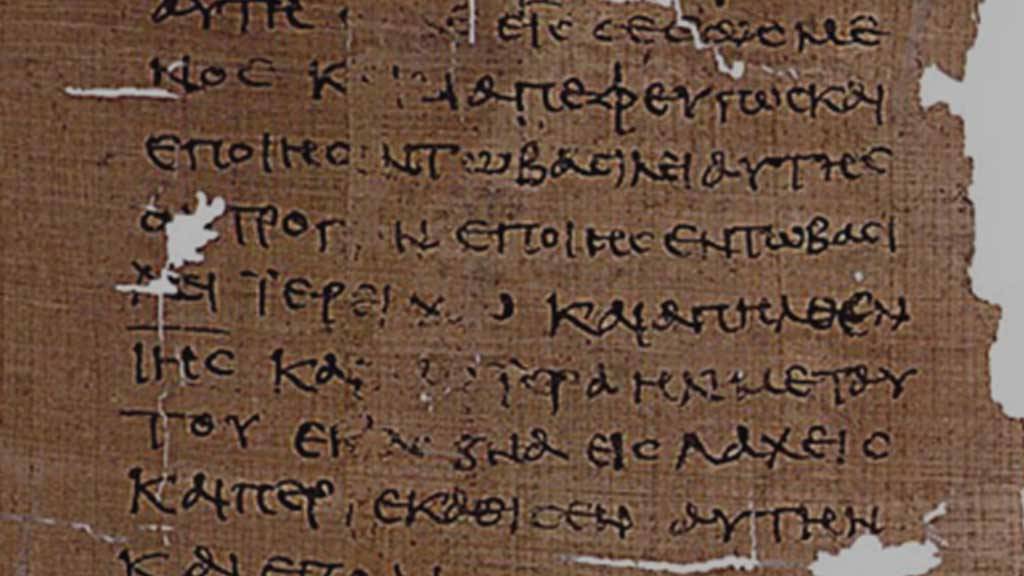I don’t claim to be an expert on the subject of textual criticism, but as I earnestly contend for the faith, I can’t help but delve into this very important subject. Previously published at The Helwys Society Forum.
Textual criticism of Scripture has resulted in believers responding in a variety of ways. Among these are questions like, “Why would we want to be ‘critical’ of the Scriptures?” and, “Textual criticism undermines the infallibility of Scripture; I want nothing to do with it!”
While we often think of the term “critic” as referring to someone who is judgmental, disapproving, or negative, we should not think of a text critic in this way. Within the arts and sciences, a critic is someone who specializes in the evaluation—and even appreciation—of works. While a critic may still be critical, the term shouldn’t be used to generalize faultfinders.
Consider a movie critic: at times he must identify flaws and failures, but at other times he is affirming and complimentary. This critic is assisting in creating the best possible future product. This applies not only to art, film, and literature, but also to biblical critics. Some claiming to be Bible critics have criticized God’s Word by finding fault. Still, others have helped to strengthen the argument for Scripture’s validity and accuracy.
In this essay, I will present an introduction to textual criticism and offer practical considerations and contexts in which one may encounter questions about biblical textual criticism.
In Search of the Original Text
Textual critics seek to determine the form of the original text, not so much the meaning of the original text. Textual criticism has been described as both an art and a science. It is a science because “specific rules govern the evaluation” of texts, and it is an art “because these rules cannot rigidly be applied in every situation.”[1]
If the original documents still existed, we’d have no need for textual criticism. At the same time, we must understand that the absence of the original documents isn’t a reason to doubt Scripture’s credibility. Textual critics have devoted their lives to assimilating the original text, even though the original documents don’t exist. The large amount of manuscripts (copies) that we do possess have preserved the original text apart from the original documents.[2]
Westcott and Hort suggest that “approximating as nearly as we could to the spelling of the autographs by means of documentary evidence”[3] is the goal, while Souter states that one should seek with “knowledge and trained judgment, to restore the very words of some original document which has perished.”[4] Aland and Aland contend that “only one reading can be original.”[5] While these scholars seem somewhat divided on how precisely someone could assemble the original, they are united in this search for the original text. This leads to the second discussion. If there are variants, how can Scripture be trusted?
The Impact of Variants
As we survey the landscape of textual variants, somewhere between 200,000 and 400,000 textual variants surface.[6] As you consider this seemingly overwhelming number of variants, here are some points to keep in mind:
These 200,000-400,000 variants include not only variants within the 5,800 Greek manuscripts, but also other sources (e.g., quotations of Scriptures in the writings of the church fathers).
There are meaningful and insignificant variants (defined below). Meaningful variants involve only one percent of all textual variants.
‘’We have more than 1,000 times the manuscript data for the NT than we do for the average Greco-Roman author. Not only this, but the extant manuscripts of the average classical author are no earlier than 500 years after the time he wrote.”[7] We have several NT manuscripts that were copied just decades after the original documents!
For more on the number of variants and the manuscripts, visit Daniel B. Wallace’s blog. He is by far the best resource for this topic.
Meaningful and Insignificant Variants
As illustrated below in Table 1, spelling changes do exist that cause the meaning to change; however, the largest group of textual variants contain spelling changes that do not change the meaning. By use of context (internal evidence) and crosschecks with other manuscripts (external evidence), this large percentage has been labeled as insignificant variants.[8]
For instance, if a student were to misspell his name on the coversheet of a research paper (e.g., Daniel Webter vs. Daniel Webster), the professor could probably decipher which student turned in the paper (unfortunately, I did this once).
Likewise, if a scribe were to accidentally write Jhn, instead of John, that wouldn’t present a problem because Jhn does not actually spell a word. Because the variants in Table 1 actually spell words, they are considered meaningful, not because they create meaningful doctrinal changes but because the misspelling is actually a word. Furthermore, in the ancient world, resources like Google, Grammar Girl, and Merriam-Webster.com didn’t exist. Spelling and grammar changed from region to region, and scribes adjusted the texts along the way.
Table 1
These are actual variants that cause changes in the meaning to the text.[9] These are classified as “meaningful” variants.
Example 1: 1 Thessalonians 2:7 Example 2: Romans 5:1
Εγενηθημεν νηπιοι “we were babes” εχομεν “we have”
Εγενηθημεν ηπιοι “we were gentle” εχωμεν “let us have”
Meaningful variants involve about one percent of all textual variants.
But even here, the situation can be overstated.[10] Notice that in the examples of meaningful variants in Table 1, no major biblical doctrine is affected. Whether Paul is saying in Romans (Example 2), “we have peace” (indicative) or “let us have peace” (imperative), the fact remains that the believer can have peace. In 1 Thessalonians (Example 1), Paul is either describing himself and the fellow believers as “gentle” or as “little children.” We can observe that neither reading disrupts a core theological truth.[11]
The Origins of Variants
Variants have occurred in two ways over the last two thousand years: accidentally and intentionally. Differentiating between meaningful/insignificant and accidental/intentional is helpful at this juncture. Meaningful/significant refers to the variant’s impact on the meaning of the text. Accidental/intentional refers to the author’s intentions and how the variant originated (whether or not the variant occurred by accident or purposeful intent).
A variety of accidental variants could happen while a scribe was making a copy of a manuscript. Accidental variants were caused from dropping a letter, reversing letters, incorrectly spacing letters, or inadvertently adding letters or words as the scribe was thinking of another passage. Intentional alterations occurred when the scribe desired to smooth out what seemed to be a grammatical issue, harmonize two parallel passages, correct apparent discrepancies, or make doctrinal emphasis.[12] Such alterations are especially common in the Gospels; however, these intentional changes were not for the purpose of changing the meaning of Scripture, but to give more emphasis to truth already expressed in other places in Scripture.
We find a good example of scribes attempting to add clarity in the early church’s use of daily readings (called lectionaries). In the Gospel of Mark, the name Jesus isn’t mentioned one time in eighty-nine verses. Only “he” is used. In these lectionaries, the scribe would copy the word “Jesus” rather than “he” to provide clarity.[13]
Practical Considerations
Whether you’re helping a fellow believer, answering a skeptical friend, or clarifying the subject of textual criticism in your own mind, here are a few questions you may encounter:
- Does T.C. impact the doctrine of the infallibility of Scripture?
- Does this impact the doctrine of the preservation of Scripture?
- If I am approached by a skeptical friend who doubts Scripture’s validity because the original documents don’t exist, could T.C. be of some help?
- How might I answer a skeptical friend who claims that the Bible is full of mistakes?
- Do we have good reason to be skeptical of modern versions which “remove” 16 verses from the KJV?
- Should I address a textual issue when it occurs in a passage that I’m teaching or preaching?
Because a student of the Word will regularly encounter these questions, a base knowledge on the topic of textual criticism is vital. The “my Bible says it, I believe it, and that settles it” approach is simply not enough for doubting skeptics and struggling believers.
While we have much to be optimistic about concerning these matters, we must still study these issues with diligence and be prepared to interact humbly with the people in our churches and our skeptical friends.
Conclusion
“And though this world, with devils filled, should threaten to undo us, we will not fear, for God hath willed His truth to triumph through us.” Martin Luther’s statement captures the reality that God has willed to preserve His mighty Word through the meager efforts of men. God’s Word is forever, firmly established in heaven; yet, on earth God’s will and Word must be sought if men and women desire to be the agents through whom His will is accomplished on earth as it is in heaven.
The noble cause of textual criticism is not just a historic venture, but an endeavor to uphold God’s very words given to mankind, that we may know Christ, the incarnate Word, and have a relationship with God the Father. Textual Criticism is not something to be feared and avoided, but an art and science to be understood and valued.
____________________
[1] Paul D. Wegner, A Student’s Guide to Textual Criticism of the Bible (Downers Grove: IVP Academic, 2006), 24.
[2] Wayne Grudem, Systematic Theology: an Introduction to Biblical Doctrine (Grand Rapids: Zondervan, 1994), 96.
[3] Brooke Foss Westcott and Fenton John Anthony Hort, The New Testament in the Original Greek: Introduction, Appendix (Nabu Press, 2010), 303; quoted in Sang-Il Lee, Jesus and Gospel Traditions in Bilingual Context. (Berlin: Walter de Gruyter, 2012), 296.
[4] Alexander Souter, The Text and Canon of the New Testament (New York: Charles Scribner’s Sons, 1917), 3; quoted in Sang-Il Lee..
[5] Kurt Aland and Barbara Aland, The Text of the New Testament: An Introduction to the Critical Editions and to the Theory and Practice of Modern Textual Criticism (Grand Rapids: Wm. B. Eerdmans Publishing Co., 1995), 280; quoted in Sang-Il Lee,.
[6] Bart D. Ehrman, Misquoting Jesus: the Story Behind Who Changed the Bible and Why (New York: HarperOne, 2005), 89-90. Lee Strobel responds to this author in Finding the Real Jesus.
[7] http://blogs.thegospelcoalition.org/justintaylor/2012/03/21/an-interview-with-daniel-b-wallace-on-the-new-testament-manuscripts/
[8] Darrell L. Bock and Buist M. Fanning, eds., Interpreting the New Testament Text: Introduction to the Art and Science of Exegesis (Wheaton: Crossway, 2006), 34.
[9] Daniel J. Ebert, “New Testament Textual Criticism” (lecture, Central Baptist Theological Seminary, Virginia Beach, VA, July 2012).
[10] Bock and Fanning, 37.
[11] Ed Hindson and Ergun Caner, The Popular Encyclopedia of Apologetics (Eugene, OR: Harvest House Publishers, 2008), 110.
[12] Daniel J. Ebert, “New Testament Textual Criticism” (lecture, Central Baptist Theological Seminary, Virginia Beach, VA, July 2012).
[13] Lee Strobel, Finding the Real Jesus: A Guide For Curious Christians and Skeptical Seekers (Grand Rapids: Zondervan Publishing Company, 2009), 26.







